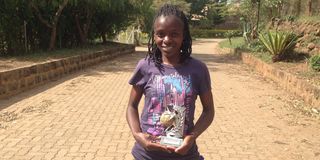Deaf basketball girl ‘inspired’ by State recognition

Mercy Mideva with her 2019 National Deaf Basketball Championship Most Valuable Player trophy at Ongata Rongai, Kajiado on October 24, 2020.
What you need to know:
- Mideva, who doubles up as Rongai Deaf Basketball coach, thanks to her eight years experience said once the team has developed, she will no longer play for the Nairobi Deaf Queens.
- “More people continue to join the team and soon I may leave Deaf Queens and only play for Rongai Deaf Basketball,” she said.
Kenya international Mercy Mideva says her recognition as a heroine during the Mashujaa Day celebrations has inspired her to increase her effort in promoting deaf basketball in the country.
Mideva, 27, said she never expected to be among the 30 athletes, who were feted during the national celebrations held last Tuesday at Gusii Stadium in Kisii, and attended by President Uhuru Kenyatta.
She was honoured for being the 2019 Most Valuable Deaf Basketball Player, and the best player of the year for Rongai Deaf Basketball.
“I never expected this recognition. The feeling was so good that it has left me with the drive to work hard in everything I do concerning deaf basketball,” said Mideva.
Helping Rongai Deaf Basketball, which she founded sometime in 2018, grow to become a top team in the country is her main goal
Mideva was born with hearing ability but turned deaf at 15 years after suffering from a serious illness. It is at St Angela Mumias Secondary School for the Deaf in Kakamega that her basketball journey started after quitting athletics due to the stiff competition she encountered.
She founded the Rongai Deaf Basketball team a few months after returning from the 2017 Deaflympics in Turkey, where Kenya finished ninth.
Apart from seeking to have many deaf people play basketball, Mideva says she was driven by the need to have a deaf basketball club near her - to save her the burden of spending a lot of time, and money travelling to Nairobi Railways Club to train with the Nairobi Deaf Queens.
“I never wanted it to be that every time I want to play, I have to go to Nairobi. It dawned on me that there could be some deaf people around here (Rongai), whom I could play with,” says the point guard.
A local church has been kind to the team of 18 deaf players (nine men and nine women) by allowing them to train on a basketball court in the compound.
Mideva, who doubles up as Rongai Deaf Basketball coach, thanks to her eight years experience said once the team has developed, she will no longer play for the Nairobi Deaf Queens.
“More people continue to join the team and soon I may leave Deaf Queens and only play for Rongai Deaf Basketball,” she said.





